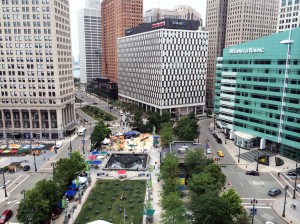Every week, we bring you the latest news in placemaking, landscape architecture and urban planning, the nature-mental health link, and much more. Check back each week for new roundups and items.
Hot and Getting Hotter: Heat Islands Cooking U.S. Cities
“Cities are almost always hotter than the surrounding rural area but global warming takes that heat and makes it worse. In the future, this combination of urbanization and climate change could raise urban temperatures to levels that threaten human health, strain energy resources, and compromise economic productivity…With more than 80 percent of Americans living in cities, these urban heat islands — combined with rising temperatures caused by increasing heat-trapping greenhouse gas emissions — can have serious health effects for hundreds of millions of people during the hottest months of the year.”

Can Detroit Restart Its Engine?
“Detroit is a dichotomy. The city’s innovative spirit that brought us the assembly line and the modern auto industry lives on in wildly successful new enterprises like Quicken Loans. Yet Detroit’s much-publicized poverty has spawned a depressed yet resilient culture that continues to struggle to pull itself out of the gutter…Some of the city’s most blighted neighborhoods aren’t waiting on the system — or the moguls — to help them. The residents of Brightmoor, an area of abandoned homes, drugs and homicide, are taking back their neighborhood through planned community efforts.”
Want to See How Fast Coastal Wetlands and Forests Are Vanishing?
“Buildings, pavement, golf courses, and other development are taking big bites out of America’s coastal wetlands and forests, and now new federal data is charting just how much is being lost. Between 1996 and 2011, total coastal forest cover dropped by more than 16,000 square miles — an area roughly the size of Delaware, Maryland, and Rhode Island combined. Some 1,536 miles of wetlands were lost over that period as well, according to the data from the National Oceanic and Atmospheric Administration.”
Farmers Face an Uncertain Future in a City Rich with Urban Agriculture
“With around 150 stalls, the Saturday organic farmers market at Farroupilha Park would give almost any outdoor produce market a run for its money. For nearly 30 years, organic growers have been congregating in this leafy corner of Porto Alegre…While roughly three-quarters of vendors come from outside the city limits, the remaining quarter are even closer as they truck in their wares from the relatively rural area in the southern part of the city, a unique feature of Porto Alegre’s landscape that is the subject of soul searching on what a sustainable and resilient city should actually look like.”
